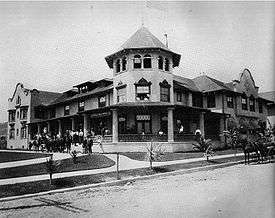Hollywood Hotel

The Hollywood Hotel was a famous hotel, society venue of early Hollywood, and landmark, formerly located at 6811 Hollywood Boulevard, on the north side, extending from Highland Avenue to Orchid Avenue, in central Hollywood, Los Angeles, California.
History
Early years

The Hollywood Hotel opened in December 1902. It was built by early Hollywood developer H.J. Whitley, to support selling residential lots to potential buyers arriving from Los Angeles by the electric Balloon Route trolly of the Los Angeles Pacific Railroad.[1][2] It was developed on property owned by Harrison Gray Otis, George Hoover, and Whitley.[2] Located on the west side of Highland Avenue, the elegant wood structure with Mission Revival style stucco facades and broad verandas also fronted on unpaved Prospect Avenue, lined with California pepper trees. The hotel was sited among lemon groves then at the base of the Hollywood Hills, part of the Santa Monica Mountains in the area. Whitley was instrumental in improvements to Prospect Avenue, which in 1910 was renamed Hollywood Boulevard. Increasing business compelled the building of an additional 40-room wing onto the hotel in 1905.[2]
Whitley surrounded the hotel with 3 acres (1.2 ha) of cultivated gardens. He operated the establishment as a country resort hotel as the developing community of Hollywood first established itself.[3][4][5][6][7]
In 1906 the heiress Almira Hershey, who was then living in a mansion on Bunker Hill in Downtown Los Angeles, took a horse and buggy ride to see the hotel that was being advertised in the Los Angeles Times. She was so impressed with the Hollywood Hotel she decided to buy it.[2] She hired Margaret J. Anderson who had worked for her at the Darby and the Fremont Hotels, which Hershey owned, as the manager.[8] Under Anderson's management, the hotel expanded from 16 rooms to 250 and became well known in the area,[9] but the two women had a contentious relationship and Anderson left to move to the Beverly Hills Hotel in 1912.[10]
Motion picture era
The fame of the Hollywood Hotel, like that of Hollywood, came from its identity with the Hollywood movie industry, beginning in the 1910s. Legends of the early industry first stayed at the hotel, such as Jesse Lasky, Carl Laemmle, Louis B. Mayer, Harry Warner, and Irving Thalberg. Producers, directors, writers and technicians held conferences on the broad verandas.
There was a 'stream' of silent film movie stars and movie moguls passing through. Some of the movie industry people resided in the hotel, and many attended the dances held Thursday nights in the ballroom. It was considered "the" place to be seen and the cultural center of Hollywood. To identify where certain people regularly sat to dine, the hotel had stars with the names of celebrities painted on the ceiling above their tables.
Among the scores of movie stars who stayed at the Hollywood Hotel through the years was Rudolph Valentino, who lived in room 264. He met his first wife, Jean Acker, in the hotel, where they were married in 1919 and spent their honeymoon. Other stars included Ethel Barrymore, Norma Shearer, and Valentino's second wife Natasha Rambova. The hotel also hosted notable guests from beyond Los Angeles and the United States.
Songwriter Carrie Jacobs Bond composed her famous song A Perfect Day, and sang it, while a guest at the Hollywood Hotel.
In 1922 Almira Hershey lost a breach of contract dispute with the hotel's long time manager George Krom, which allowed him to purchase the hotel.[2]
Decline and demolition
In the early 1940s, Charles E. Toberman, a real estate developer who was known as "Mr. Hollywood," acquired all the stock of the Good Hope Company, which owned the Hollywood Hotel property. He wanted to tear it down then and redevelop the block, but was halted because of the restrictions on building materials during World War II. By the 1950s, the hotel was run down and faded from its former glory. Developers were adamant that renovating and restoring the property was out of the question.
Though the Hollywood Hotel was an architectural landmark and had housed many of the great Hollywood stars in its day, it was razed in August 1956 to make way for a US$10 million development. It was replaced by a twelve story office building for the First Federal Savings & Loan Association of Hollywood, a shopping center, and parking lots.
In 2001 those were demolished, and the Hollywood and Highland Center shopping and entertainment complex was built on the site. It includes the Dolby Theatre (formerly known as the Kodak Theatre), the current home of the annual Academy Awards ceremony.
See also
- Hollywood history and culture
- Mission Revival architecture in California
References
- ↑ Millennium Hollywood,net: "HJ Whitley and the Original Hollywood & Highland, The Hollywood Hotel”
- 1 2 3 4 5 Google Books: Historic Hotels of Los Angeles and Hollywood, by Linda McCann, Dace Taube, Claude Zachary, Curtis C. Roseman]
- ↑ Los Angeles Herald (August 31, 1951)
- ↑ California Historian Volume 54, Number 4 published by Conference of California Historical Societies (2008)
- ↑ Los Angeles Times Magazine (January 4, 1987)
- ↑ "California and Californians," by Rockwell Dennis Hunt and Nellie Van de Grift Sanchez (1930)
- ↑ [Jonathan Magazine http://www.thefatherofhollywood.com/Jonathans.pdf Jonathan Magazine: "The Great Developer"] (March 2009)]
- ↑ Vaught, Steve. "Happy 100th Birthday to a Grand Old Lady – The Beverly Hills Hotel!". Paradise Leased. Paradise Leased. Retrieved 2 August 2015.
- ↑ Wanamaker, Marc (2005). Early Beverly Hills. Charleston, SC: Arcadia. p. 25. ISBN 978-0-738-53068-0. Retrieved 2 August 2015.
- ↑ "Quarrel Closes Hotel in South". San Francisco, California: San Francisco Chronicle. 1 May 1912. p. 3. Retrieved 2 August 2015 – via Newspapers.com.

External links
| Wikimedia Commons has media related to Hollywood history. |
Coordinates: 34°06′07″N 118°20′23″W / 34.10186°N 118.33971°W